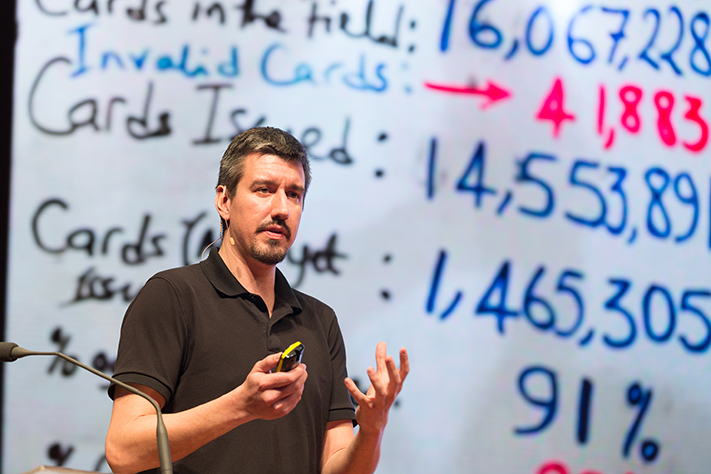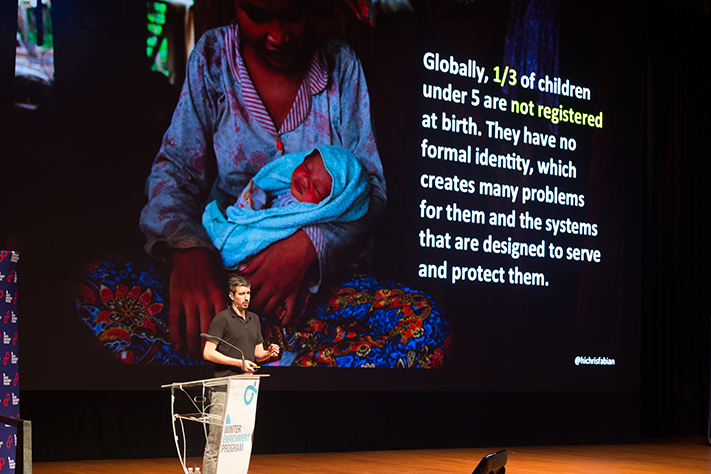The new way we do things

Christopher Fabian, the co-founder of UNICEF’s Innovation Unit, discussed how humanity must use data and technology to improve lives worldwide. Photos by Lilit Hovhannisyan.
By the year 2030, the majority of the world’s population will be living in cities. Scientists have understood the need to rely on data to meet this challenge by developing various technologies, such as information and communication technology (ICT) and the internet of things, to usher in the era of smart cities.
During his recent visit to KAUST as part of the University's 2017 Winter Enrichment Program (WEP), Christopher Fabian, the co-founder of UNICEF’s Innovation Unit, argued that a vital part of this challenge facing humanity is applying these technologies to the world of global development, policy and governmental change.
“Data is very helpful and allows you to make decisions that you can't make without it,” said Fabian.
UNICEF Innovation also believes that access to information is essential to innovation for equity by connecting the world’s most marginalized populations. Based on these principles, Fabian’s team used technology to spur innovations like mobile birth registration in Nigeria; deploying drones to transport blood samples in Malawi for early infant diagnosis of HIV; and using SMS to support mothers in Mexico.
As a result of these initiatives, birth registrations in Uganda increased by 70 percent. The Innovation Unit also helped build the world’s largest mobile health system in Nigeria, which has so far reported on more than 17 million births by SMS.

“The world is more tightly connected now. The most dangerous thing you can do in an epidemic is cut off information from the people affected,” said Fabian.
“Create a place for yourself and a job that didn't exist five years ago—that's what I did...Always start with things you are good at and things you are interested in. Be a translator between the way people do things and the new way we do things,” he said.
- By Meres J. Weche, KAUST News
By the year 2030, the majority of the world’s population will be living in cities. Scientists have understood the need to rely on data to meet this challenge by developing various technologies, such as information and communication technology (ICT) and the internet of things, to usher in the era of smart cities.
During his recent visit to KAUST as part of the University's 2017 Winter Enrichment Program (WEP), Christopher Fabian, the co-founder of UNICEF’s Innovation Unit, argued that a vital part of this challenge facing humanity is applying these technologies to the world of global development, policy and governmental change.
“Data is very helpful and allows you to make decisions that you can't make without it,” said Fabian.
Connecting populations
UNICEF Innovation also believes that access to information is essential to innovation for equity by connecting the world’s most marginalized populations. Based on these principles, Fabian’s team used technology to spur innovations like mobile birth registration in Nigeria; deploying drones to transport blood samples in Malawi for early infant diagnosis of HIV; and using SMS to support mothers in Mexico.As a result of these initiatives, birth registrations in Uganda increased by 70 percent. The Innovation Unit also helped build the world’s largest mobile health system in Nigeria, which has so far reported on more than 17 million births by SMS.

Data obtained through IoT technologies and wearables helps to connect populations often unaccounted for in remote areas of developing countries with their governments. Photos by Lilit Hovhannisyan.
Improving health and education
The ability to gather and share real-time data can vastly improve the health and educational prospects of people—especially the youth—who are often not connected with their governments. This is particularly important as the world grapples with pandemics like the Zika virus and Ebola.“The world is more tightly connected now. The most dangerous thing you can do in an epidemic is cut off information from the people affected,” said Fabian.
Innovation for the developing world
In the short-term future, UNICEF Innovation is aiming to develop and deploy 3-D printing, drones and digital currency in the developing world. These innovative technological solutions reflect the advice Fabian gave the KAUST students and community during his keynote.“Create a place for yourself and a job that didn't exist five years ago—that's what I did...Always start with things you are good at and things you are interested in. Be a translator between the way people do things and the new way we do things,” he said.
- By Meres J. Weche, KAUST News

